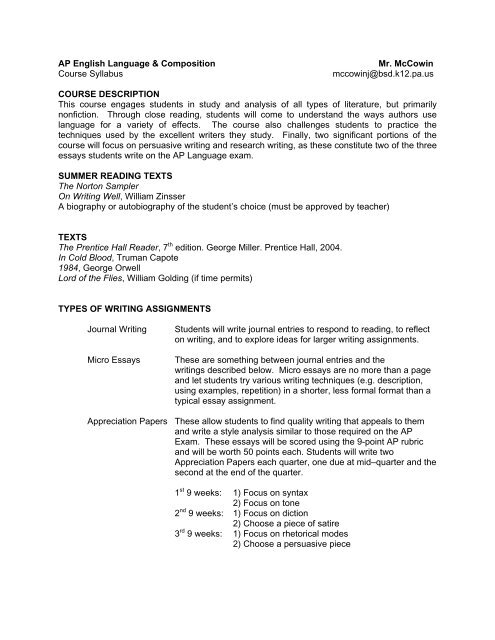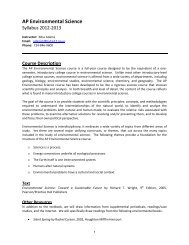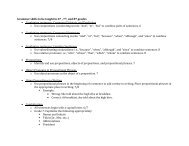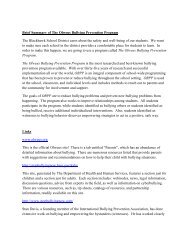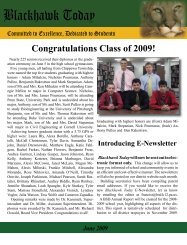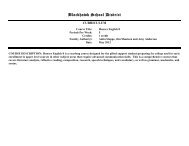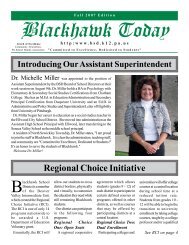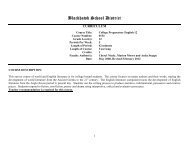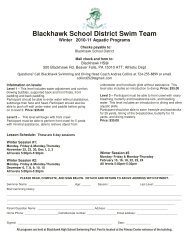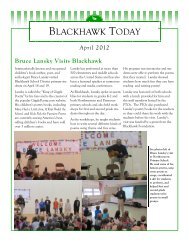AP English Language & Composition Mr. McCowin Course Syllabus ...
AP English Language & Composition Mr. McCowin Course Syllabus ...
AP English Language & Composition Mr. McCowin Course Syllabus ...
You also want an ePaper? Increase the reach of your titles
YUMPU automatically turns print PDFs into web optimized ePapers that Google loves.
Comparison and Contrast “Academic Selves” – Mary Pipher “The Color of Love” – Danzy Senna “Virtual Love” – Meghan Daum Draft Essay #2: Exposition of Consumer Life or Pop Culture Writing Skill Focus: Logical organization and coherenceProcess Analysis “My Daily Dives in the Dumpster” – Lars Eighner “The Culture of Martyrdom” – David BrooksDefinition “Adults Only” – Bob Greene “I Want a Wife” – Judy BradyCause and Effect “Black Men and Public Space” – Brent Staples “Dreadlocked” – Veronica Chambers Classic Essay: “A Modest Proposal” – Jonathan Swift Draft Essay #3: Social Commentary Writing Skill Focus: Wide-ranging vocabularyPersuasion/Argument Ethos, pathos, logos Logical Fallacies Induction and deduction The Toulmin Model of Argument Analysis – grounds, warrant, claim “The Marrying Kind” – Jonathan Rauch “The Case Against College” – Linda Lee “What Do Murderers Deserve?” – David Gelernter “The Singer Solution to World Poverty”, Peter Singer Classic Essays: “The Allegory of the Cave” – Plato“I Have a Dream” – Martin Luther King, Jr.“Letter from Birmingham Jail” – Martin Luther King,Jr.Research WritingThrough instruction, practice, and two major writing assignments, students will learn to:1. evaluate, use, and cite primary and secondary sources2. effectively integrate direct, indirect, whole, and partial quotations3. present an argument that analyzes and synthesizes several sources4. use MLA documentation5. analyze how graphics and visual images (e.g. editorial cartoons, charts,graphs, advertisement posters) relate to text and serve as texts themselvesSynthesis EssaysResearch PaperStudents will write at least one synthesis essay in response to an<strong>AP</strong> Exam prompt. These essays will be scored using the 9-point<strong>AP</strong> rubric and will be worth 50 points each.Students will write one researched argument paper of at least fivepages, which will be the fourth “draft essay” of the course. Thiswill include MLA Documentation with parenthetical citations and alist of works cited.
1984 – George Orwell Students will study doublespeak, political language, symbolism, and creation ofmood through details, diction, and imagery.In Cold Blood – Truman Capote Students will analyze syntax, diction, tone, selection of detail and more aspectsof Capote’s style.VocabularyStudents will develop a broader vocabulary through several methods, including:1. Rhetorical Terms1 st 9 weeks: Applied Practice Triple Play Terms Set 12 nd 9 weeks: Applied Practice Triple Play Terms Set 23 tests on each set: 1) matching terms and definitions2) identifying examples in a text3) creating examples in an original writing2. Vocabulary QuizzesThese will be given regularly as part of the reading quizzes from ThePrentice Hall Reader. These quizzes encourage students to look updefinitions of unfamiliar words in the essays they read.3. Tone WordsStudents will study and apply an extensive list of words to describe tone.Tone will be a regular topic of discussion with essays practice <strong>AP</strong> tests.<strong>AP</strong> Practice TestsStudents will regularly practice 40-minute essays (usually analytical or persuasive) andmultiple choice questions, some taken from past <strong>AP</strong> exams and others that are modeledafter the <strong>AP</strong> exam.FORMS OF ASSESSMENTTests/Quizzes: These will include regular reading/vocabulary quizzes, rhetorical termstests, practice <strong>AP</strong> tests, etc.Essays: Some will be in-class timed essays, others out-of-class with several drafts.Journals: These will be used for reflection, responsive writing, questioning of text,imitation of a writer’s style, etc.Participation: One of the most important ways you will learn in this course is throughdiscussion of readings, writings, etc. Therefore, contributing to thesediscussions is extremely important. Roughly 10% of your grade eachquarter will be participation. Contributing to discussions and to ourlearning experience will earn you a good participation grade. Notcontributing and/or having a negative impact on the learning experience(such as have a negative attitude, being disrespectful to others in class,etc.) will result in a poor participation grade.<strong>AP</strong> EXAM:The School district will pay for the <strong>AP</strong> Exam for anyone who wantsto take it.


